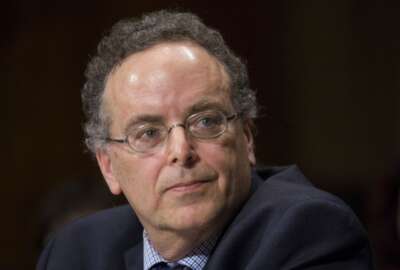
The Supreme Court looks ready to help out False Claims whistleblowers
Right now, the Supreme Court is considering a case that could boost federal whistleblowers bringing forth wrongdoing by contractors under the False Claims Act. The...
Right now, the Supreme Court is considering a case that could boost federal whistleblowers bringing forth wrongdoing by contractors under the False Claims Act. The case underscores the importance of intent and its relevance in these cases. For details and why it’s a landmark case, Federal Drive with Tom Temin spoke to noted D.C. whistleblower attorney Stephen Kohn.
Interview transcript:
Tom Temin Steph, tell us about this case. What is the Supreme Court looking at here precisely?
Stephen Kohn Sure. So it’s the super value case and they’re looking at what type of proof you need to show fraud. And the corporations, the Chamber of Commerce and the companies were arguing that if you could come up with a plausible legal argument, even after the fact, that they didn’t knowingly commit fraud, they could escape liability. So let me put it to a more understandable way and why I believe the Supreme Court will completely reject these arguments. Somebody believes they’re defrauding the government. You have actual evidence of their intent to defraud the government. In fact, they did defraud the government. But somewhere along the line, a company can argue that they should be let off the hook, because there was a plausible argument that they weren’t defrauding the government. So what they were saying was subjective evidence. In other words, evidence of the actual people ripping off the taxpayer, evidence of their intent to rip off the taxpayer could be ignored if the company came up with a rationalization that it was ambiguous whether fraud was occurring.
Tom Temin Well, what would constitute evidence that they intended to commit fraud? Say an email saying, Hey, we’re going to really stick it to them, but just don’t tell the accountants. That kind of thing?
Stephen Kohn Exactly. So in the case they were charging the drug company with charging normal people, just anyone coming off the street, $4 for a drug. But they were charging the government $20 for the same drug. So, like, if the federal agent just walked in and bought it off the shelf, they’d saved the taxpayer $16. So there were discussions while this was occurring, where the salespeople understood that they were overcharging the government. But once they got caught, once the whistleblower turned them in with evidence of their knowledge, the company said, we think the regulations were ambiguous at the time. And we think you could have plausibly argued that you could have charged people $20 for the prescription as opposed to four. And the lower courts threw the case out, they threw the whistleblower case out.
Tom Temin But did the whistleblower in that case have the objective evidence of intent there in that case?
Stephen Kohn Well, they had the evidence that the people who were overcharging the government suspected or knew they were overcharging the government. And in fact, they were overcharging the government. You can’t have a False Claims Act case no matter what evidence you have. You could have a thousand emails about someone trying to steal money from the government, but at the end of the day, here was no false claim being submitted. There’d be no liability. You need damage. So in this particular case, they were overcharging the government. The people involved at the time either knew or clearly suspected that they were, because the False Claims Act has a standard for reckless disregard. So if you kind of know what you’re doing is wrong, but you disregard all the evidence that what you’re doing is wrong, you’re supposed to be found guilty. You have a reckless disregard standard. They have a willful ignorance standard. Whereas if you put your head in the sand and just ignore all the evidence that you’re committing fraud, you can still be found guilty. So the lower courts had completely turned this on its head and were essentially, as the dissent in the lower court said, they’re just giving crafty lawyers the ability to permit literally hundreds of millions, if not billions of dollars of rip offs to the government.
Tom Temin And we’re speaking with the non crafty Stephen Kohn, founding partner of Kohn Kohn & Colapinto. And there are cases that have come up over the years, especially in federal Pricing False Claims Act, where, say, you had promised the lowest possible price in a [General Services Administration (GSA )]contract. And it really was administrative inadvertence where a price was higher than perhaps another customer was getting, even another federal customer was getting. But that was the price originally negotiated on the GSA schedule. We’re not talking about a case like that, then, correct?
Stephen Kohn Exactly. In order to have the liability under false claims, you need to show some form of knowledge and intent. So when they wrote the statute, it was either direct knowledge, email, we’re ripping off the government. Willful ignorance, which was really designed for whistleblowers. A whistleblower comes forward to the company, presents evidence of fraud, and the company willfully ignores that evidence. Essentially, it’s a way to empower internal compliance programs. If an employee goes to the compliance program with the evidence of the fraud. The company better take a serious look at it. And the third way is reckless disregard, meaning the evidence is in front of you and you choose to ignore it. So you have to have that. If it’s a simple mistake, there’s no liability. And the False Claims Act is not a negligence law. If you make a mistake, if you didn’t really understand, but as the dissent to the lower court, the court that went up on appeal said that the federal court, quote, cannot tolerate deception. So if you have evidence that the company was engaged in deception, you have defined liability. I attended the oral argument and we did file an amicus brief in the case, we studied it carefully. The judges were like, they were essentially saying, this is a simple case. It’s like, yeah, if you have evidence of deception, you can’t ignore it. But what’s really troubling is how were these arguments even raised? How could the Chamber of Commerce legitimately come before the court and say, you should ignore evidence of deception in a fraud case. That has never happened before. I mean, you can’t do that.
Tom Temin Sounds like those sirens weren’t for you, maybe they’re headed to the Chamber of Commerce or something on that case. But just a practical question. Suppose there is a clerk or a cost accountant or a billing clerk, and they are charging $20 to the government and $4 to the walk in or the subscription drug recipient or whatever the case might be, and they don’t know any better. Is that person in trouble? Or is it just the person that gave them the fraudulent price list, the one in trouble? And I guess, the corporate officers would be part of it also.
Stephen Kohn OK. You just follow up the chain. So if the person at the lowest level is simply following the instructions, they’re not going to be in trouble. If they’re making a mistake, they’re not going to be in trouble. But then you have to go to the knowledge of the person who created the instructions. Now, if they created those instructions in good faith, rely upon the regulations, they’re not going to be in trouble, even if it’s wrong. But if at the time they were drafting those regulations, a whistleblower inside the company stepped forward and said, You are deceiving the government, and explained why with plausible reasons, why they were deceiving the government. That drafter the company would either have to address those issues or face potential liability if it turns out the whistleblower was correct. In that situation, you’re in a case of either willful ignorance, they’re just going to ignore the bad side or reckless disregard for the law. Now, you can take it one step further, which is actual knowledge. The person who’s drafting the regulations had actual knowledge that they were doing an act of deception. But the False Claims Act covers reckless disregard, willful ignorance and actual knowledge. So what’s significant here, what came out in the court argument. When you’re dealing with the government, you have certain legal and ethical responsibilities. It’s not like you’re a salesperson hustling up the best price you can get selling a used car. That’s not the deal. There are rules for doing government contracting. There are rules if you’re taking money literally from all of the people of the United States, all of the taxpayers, you’re taking that money. You are under certain ethical and legal rules. One of those is you can’t ignore the bad facts.
Tom Temin And just a quick question. When will we likely hear a decision from the Supreme Court?
Stephen Kohn This decision will be issued sometime probably in June, before the court exits for the year. It seemed from the argument that most of the justices were going to overturn the lower court. And this is something else that’s very important. The False Claims Act is the most effective, anti-fraud law in the United States. It’s recovered over $70 billion cash from fraudsters, not theoretical liabilities or judgments that were never collected. Actual 70 billion. And the best estimate for the deterrent value, in other words, companies acting honestly, because they’re afraid of getting caught is at least $700 billion, ten times the amount. So the law’s been super effective. And I think the justices understood that. They understood that by lowering all these standards and making it way harder to prove the fraud would really hurt the federal treasury and all honest taxpayers.
Copyright © 2024 Federal News Network. All rights reserved. This website is not intended for users located within the European Economic Area.
Tom Temin is host of the Federal Drive and has been providing insight on federal technology and management issues for more than 30 years.
Follow @tteminWFED
Related Stories




